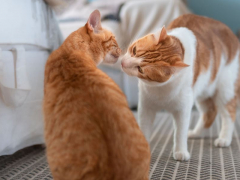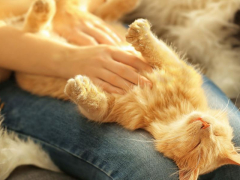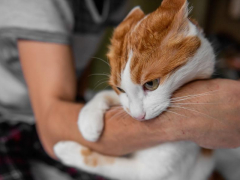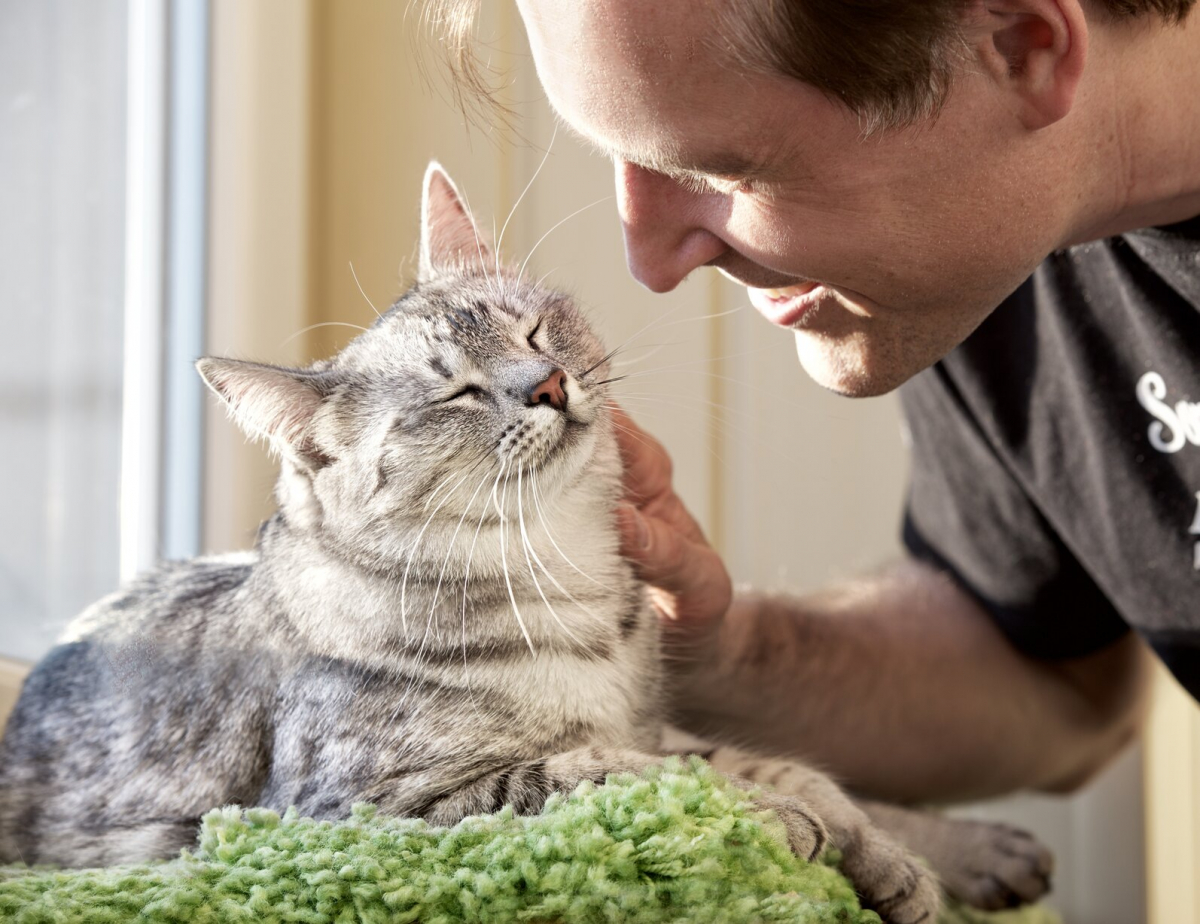
If you have ever called your cat’s name and had them look back at you blankly, you have probably found yourself wondering, “do cats understand words?” This is a familiar occurrence for most cat owners. Often, we are left wondering if our feline family members understand us at all! As it turns out, cats really do understand us, but not in the same way that we do.
So, let’s dive a bit deeper into how cats interpret language, so you can better understand how to really communicate with your cat.
Do Cats Understand Words?

Cats may be as intelligent and trainable as dogs but are not as interested in obeying human commands.
Cats do not have the cognitive skills to interpret human language. However, they are able to recognize when you’re talking to them. Think of it this way – cats understand human language in the same way we understand meowing; we know when cats are talking to us and can recognize certain tones or calls. However, we don’t know for sure what they are saying to us.
Cats are able to recognize and respond to human voices as well as gestures and expressions. Well, only if they choose to, of course.
Scientists have made some interesting discoveries about the feline brain and cat behavior in recent years. We are, however, still only scratching the surface.
In an article published by Animal Cognition, researchers discuss their findings from a study looking at whether cats respond when owners call their names. In this study, the researchers played three different human voices while their owners were out of the room. They found that the cats responded with orienting behavior (head and ear movements), rather than communicative behavior.
This was the same even with the cat’s owners. What they found was that most cats responded with a lower magnitude to the third voice than the first. Their response increased again to the voice of their owner. This tells us that cats are able to distinguish between humans using vocal cues. It’s fascinating stuff and gives us valuable information on how cats respond to our voices.
Also Read: 7 Common Cat Vocalizations And What They Mean
Do Cats Know Their Names?

Cats pick up on tone, movement, facial expressions, and verbal associations when it comes to interpreting your speaking to them.
A new study was conducted by the same scientists who made the discovery that cats are able to distinguish between human voices. In it, they found that cats respond more strongly to their own names than to other words.
Researchers found that when neutral nouns were played for the cats, they did not respond. This is known as habituation. However, at the sound of their own names, the cats responded with orienting behavior – head and ear movements. This was so regardless of whether their name was called by their owner or a stranger,
It makes sense that cats respond to their name. This is because it often results in a positive outcome, such as food or playtime. Neutral nouns tend to have no benefit or punishment, so cats will ignore these. This fascinating study shows us that cats are able to discriminate between the content of human sounds based on phonemic differences.
Of course, this research doesn’t prove that cats actually understand the concept of a name or any other words. It simply proves that cats have the capability for associative learning and interpretation of sounds that result in an action, such as reward or punishment. It also doesn’t mean your cat will always come when you call!
Less than 10% of cats studied actually moved toward the sound, despite responding to it by turning their head and moving their ears. One scientist found that cats are just as good as dogs at learning. However, cats are less keen to demonstrate what they’ve learned to their owners!
Any cat owner will know that our feline family members are highly independent. They simply haven’t been domesticated to respond to our human orders.
Also Read: Why Does My Cat Ignore Me?
How Many Words Do Cats Understand?
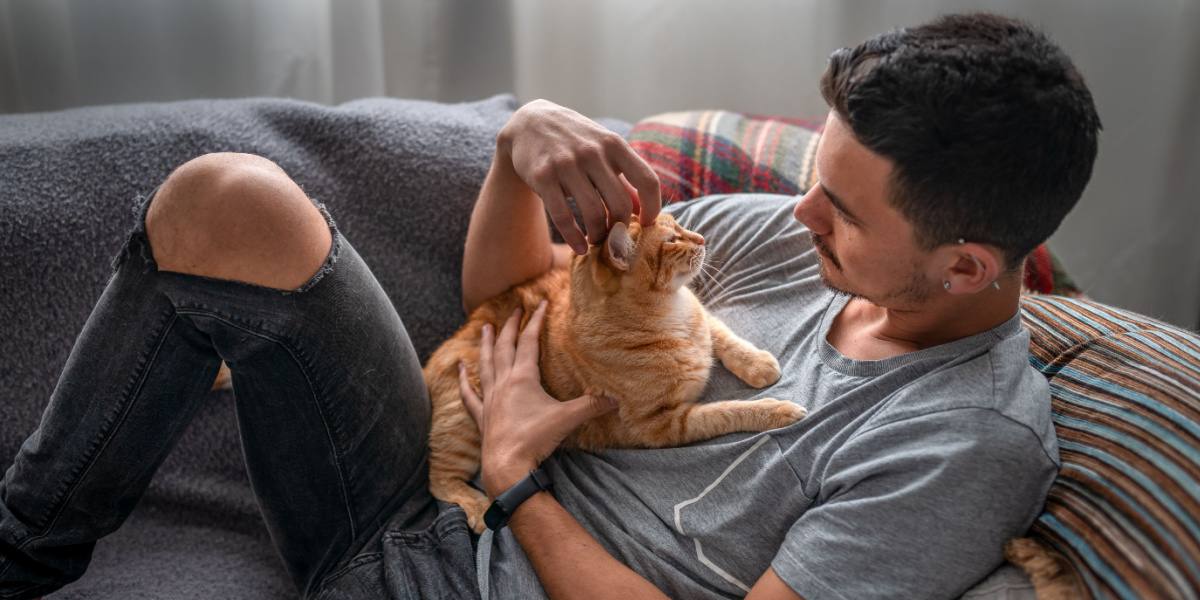
While cats may not understand the meaning of words, they can understand the meaning of your tone.
It is thought that cats understand around 20-40 human words, and some might recognize up to 50. However, it’s perhaps more appropriate to say that cats are able to associate and distinguish words rather than understand their meaning.
Our feline family members associate words with the tone, action/outcome, and body language when they are connected to feeding, petting, or playtime. The words that are repeated most frequently are the ones our cats are most likely to respond to.
Also Read: How Do Cats Communicate With Each Other? A Veterinarian Explains
How Should I Communicate With My Cat?

Speaking to your cat frequently is a bonding experience, and should not be overlooked.
Although we know that cats don’t understand language in the same way we do, we do know that they respond positively to their owner’s voices. And while they might not do as we tell them, it’s still important to engage in conversation with your cat!
Talking to your cat while petting them, feeding them, or at any other time during the day helps to strengthen and reinforce your bond. Although cats don’t fully understand us, and we don’t know what all their meows mean, no cat owner can deny that chatting with your cat helps create a special relationship and bond.
You should always talk in a gentle and positive tone, never harsh. You can also use positive gestures such as smiling. You’ll notice your cat pricks their ears up and responds to certain tones and words, especially if they are associated with positive actions such as feeding.
While cats might learn to recognize words such as ‘dinner,’ ‘good boy.’ or ‘no,’ the words you use aren’t actually as important as the way you speak. If you say ‘no’ in the same tone as ‘good boy’, your cat won’t understand. You need to make sure your tone matches the word and keep it consistent.
Always reward your pet for positive behavior and responses to commands. With patience and consistency, you absolutely can teach cats to understand and respond to short and easy commands!
The use of harsh tones, raised voices, or stern words can quickly be associated with punishment. This is likely to only frighten your cat. If repeated consistently, this can cause your cat stress, or even lead them to become frightened of you.
Also Read: How Cats Choose Their Favorite Person?
Do Cats Like Being Talked To?
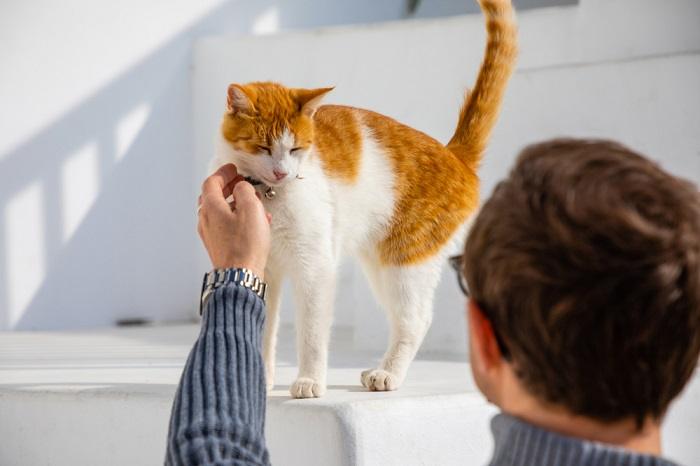
Cats enjoy hearing the sound of their owners’ voices because they know it comes from the person who feeds and cares for them.
Our feline family members absolutely do enjoy being talked to. You might notice your cat responds positively to your voice by pricking up their ears, lifting their head, meowing, purring, rubbing around you, or head-butting.
Your cat should be relaxed and happy to hear your voice. We do know that talking to our cats strengthens the bond that we have with them.
Cats are highly intelligent creatures, and while they lack the cognitive ability to understand words and language, they are able to develop responses to certain words through association with certain actions.
Scientific research has also proven that cats are able to recognize and respond to their own owner. They can also understand or learn their own names. The way our cats respond varies. Much of it depends on their perception of environmental, facial, and vocal cues.
Talking to your cat is very important to strengthen your bond. Through using body language and different tones of voice, your cat will soon learn to associate certain words with outcomes, such as feeding or playtime.
Also Read: Why Does My Cat Attack My Feet?
